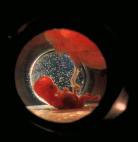Concern about whether or not childhood immunizations can trigger developmental delays in some children has been a growing question on the minds of parents in a world in which environmental toxins and their health consequences are regularly being exposed.
The medical establishment swears up and down that the mercury once used in vaccines is not the type that can cause damage – the same medical establishment that took thirty years to decide if eggs were part of a healthful diet and changed their position several times due to new research findings.
The government assures us there is no correlation between autism and childhood immunizations - the same government that allowed civilian exposure to radiation from nuclear testing.
Many parents are now asking to skip certain vaccines or to give the vaccines on a slower schedule to reduce the number of vaccines entering the system at one time. And, yes, some parents are skipping them altogether. Since immunizations are at the heart of pediatric medicine, this has raised an outcry among pediatricians. Many are willing to kick patients out of their practice either for not wanting to vaccinate or for simply asking to slow down the immunization schedule. In a recent study, 39% of pediatricians surveyed indicated that they would be willing to dismiss a family for refusing all vaccinations and 28% would dismiss for refusing select vaccines. The study’s authors urged pediatricians not to dismiss families but instead continue to see the patients so that they would have additional opportunities to educate the family. In fact, the authors recommend that this issue be raised every time the family comes to the office. Ironically, the authors argue that if the pediatrician dismisses the family that the children may have limited access to health care. There is no mention of what effect raising a contentious issue every time they come into the office might have on the family.
The American Academy of Pediatrics (AAP) notes that four percent of pediatricians have refused an immunization for their own children. They also recommend that pediatricians listen carefully and respectfully to parents’ concerns, recognizing that some parents may not use the same decision criteria as the physician and may weigh evidence very differently than the physician does. The main goal of medical ethics is to find the most humane and encompassing solution to a dilemma. A humane and encompassing solution to this conflict would support real listening on the part of both parties and encourage some sort of compromise that could foster mutual respect.
Private correspondence with the study’s main author revealed deeper insight into the study’s recommendation. When asked about a compromise such as delaying the immunization schedule so that vaccines could be given one at a time instead of in batches, the response was twofold: first, that that would delay coverage of children for a few extra months, and secondly, that doing so would encourage parents to think that there was some validity in their beliefs and that wasn’t an acceptable message to send.
How does one foster mutual respect when one party believes that there is no validity to the other party’s stance? Is it possible to agree to disagree? What harm does it do to accept that people may weigh evidence and benefit differently, as the AAP suggests? Flip the question around and ask what good it does to accept that people may weigh evidence and benefits differently. The good is fundamental – it is respect for individual autonomy. Autonomy, rightly or wrongly, is the cornerstone of western medical ethics.
Not so long ago physicians as a group were accused of being generally paternalistic toward patients. Thirty years ago it was common practice not to disclose grave diagnoses to patients when there was little curative treatment that medicine could offer. The rationale was that is would be too distressing for patients to be given a death sentence. That sort of attitude has changed, as well as the state of medicine, and today a physician would be found to have committed malpractice if he or she withheld a diagnosis from a patient. The change was gradual and there has been some meeting of the minds. The intention behind paternalism in most cases was a beneficent one – wanting to spare the patient and family distress. Medical ethics recognizes that beneficent intent and holds that there are limited, justified uses of paternalism even today. But what ethical stance is behind the insistence that immunizations are not harmful? Beneficence? Not likely. Wanting all children to be vaccinated is a form of beneficence because it refers to a desire to spare children and adults from serious illnesses. But the current debate isn’t about whether or not it is a general public good or even a specific individual good to be vaccinated. The fight is not about an ethical principle at all. It is about who is right.
That pediatricians are willing to take the stance that they know vaccines are safe and they are so certain of this that they are willing to dismiss families from their practices is a sure sign to me that hubris is now the biggest threat to individual autonomy.










